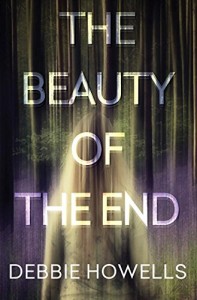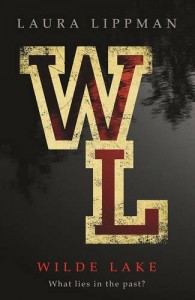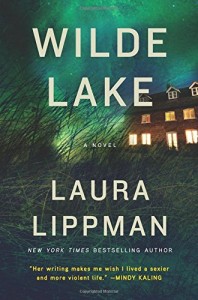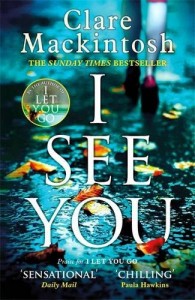 The Beauty of the End by Debbie Howells
The Beauty of the End by Debbie Howells
Published by Kensington
Wilde Lake by Laura Lippman
Published by Faber & Faber UK, William Morrow US
I See You by Clare Mackintosh
Published by Sphere
Trust – and the lack of it – is a crucial aspect of life in the twenty-first century. With cyber criminals indulging in identity theft or  impersonating the innocent to entice their victims into dangerous proximity, apparently respectable financial institutions rigging markets, politicians lying, admired celebrities turning out to have been paedophiles, and supposed victims setting off reputation-ruining and pointless historical investigations of the innocent , it sometimes seems as though anyone who trusts someone else is a naïve fool.
impersonating the innocent to entice their victims into dangerous proximity, apparently respectable financial institutions rigging markets, politicians lying, admired celebrities turning out to have been paedophiles, and supposed victims setting off reputation-ruining and pointless historical investigations of the innocent , it sometimes seems as though anyone who trusts someone else is a naïve fool.
This month’s novels latch on to this widespread insecurity in three very different cases of individuals trying to find out the truth about people they love. Debbie Howells offers Noah Calaway, a failed lawyer and hard-working hack writer, summoned to the aid of the only woman he ever loved. He met April when they were at school, loved her, misunderstood her, and eventually lost her. Now their mutual friend, Will, phones to tell Noah that April was suspected of murder before trying to kill herself. She is in intensive care and needs his help. At the same time Ella, a troubled adolescent, is trying to tell the latest in a long stream of psychotherapists exactly what she has discovered about her apparently conventional family.
Flashing backwards and forwards, Howells’s narrative sets up mystery after mystery before eventually revealing the truth that makes sense of everything the characters have suffered. And, as is the way of this kind of investigation, the real facts about other people also reveal fundamental but ignored knowledge of themselves.
 Laura Lippman takes To Kill a Mockingbird as her inspiration for a novel about Lou Brandt, a lawyer in Howard County, who has just taken over the position of State’s Attorney, once filled by her adored father. Lou grew up hero-worshipping not only her father but also her brother, who was older, taller, cleverer, much more popular than she could ever be. Their mother died and their father brought up both children as well as he could. Now Lou is widowed, with two children born to a surrogate mother. All three of them are living in her old family home with her father, who is increasingly vague and unable to care for himself. An inexplicable murder case, her first as State’s Attorney, smashes all her old ideas about her past and her family. Some of the secrets that are revealed as she delves into the case are trivial; others, shocking.
Laura Lippman takes To Kill a Mockingbird as her inspiration for a novel about Lou Brandt, a lawyer in Howard County, who has just taken over the position of State’s Attorney, once filled by her adored father. Lou grew up hero-worshipping not only her father but also her brother, who was older, taller, cleverer, much more popular than she could ever be. Their mother died and their father brought up both children as well as he could. Now Lou is widowed, with two children born to a surrogate mother. All three of them are living in her old family home with her father, who is increasingly vague and unable to care for himself. An inexplicable murder case, her first as State’s Attorney, smashes all her old ideas about her past and her family. Some of the secrets that are revealed as she delves into the case are trivial; others, shocking.
Lou is a terrific character and it is impossible not to ache with sympathy for her childhood struggles to find acceptance from her peers or any kind of self-esteem – or her battle to balance an intensive working life with her family responsibilities. But the ultimate message from this intelligent examination of past and present is that we cannot make fair judgements about crimes or sins committed then on the basis of the way we think now. This is a troubling but important point.
Clare Mackintosh’s second novel is set entirely in the present, but again deals with people needing to find out the truth about people they have trusted. The narrative is divided between three main characters: a nameless cyber criminal, who takes money from potential stalkers interested in women they can watch (and worse) during their daily commute; Kelly Smith, a police officer demoted from CID to British Transport Police after a serious misdemeanour; and Zoe Walker, now working in an estate agency after long stints in Tesco to pay the mortgage after her divorce and bring up her two children. This is a clever, fast-moving novel about some very modern crimes and some familiar female dilemmas. Mackintosh makes it possible to suspect almost everyone before revealing one wholly unexpected villain and one less unexpected but more painful.
trusted. The narrative is divided between three main characters: a nameless cyber criminal, who takes money from potential stalkers interested in women they can watch (and worse) during their daily commute; Kelly Smith, a police officer demoted from CID to British Transport Police after a serious misdemeanour; and Zoe Walker, now working in an estate agency after long stints in Tesco to pay the mortgage after her divorce and bring up her two children. This is a clever, fast-moving novel about some very modern crimes and some familiar female dilemmas. Mackintosh makes it possible to suspect almost everyone before revealing one wholly unexpected villain and one less unexpected but more painful.
All of these novels show that the ability to trust may be an appealing virtue but it can also be a fast-track to manipulation and disaster.
